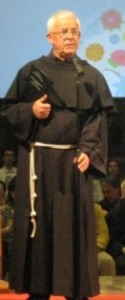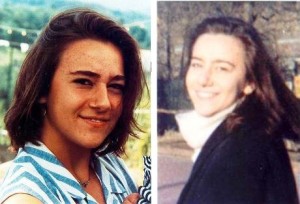 |
Chiara Luce Badano as a young attractive healthy girl
All human beings search for the good in life – as they see it, and underneath, all, in their own way, are seeking happiness. When you begin to really think about this, there are so many different aspects; our present culture in England finds many of the young are ‘wounded’ people – those who are wounded, already, because of events in their young lives – those ‘wounded’ because of a physical condition, perhaps from birth, (i.e. those born deaf, blind, with learning difficulties, or with genes that could make them ‘unbalanced’, psychologically). All will make choices at every stage of their lives – choices that affect all that happens to them, subsequently. In most cases, the making of choices is not done in isolation, but usually in the context of those who are a part of their lives, and involved within the events that happen to them. Some can make choices that will lead them to the finding of true, internal, happiness, despite an external condition. Others make choices that can be mistaken and harmful, many times leading to anguish in many different ways. St. Augustine of Hippo argues that, even when we sin, we are seeking happiness, and we will then learn, if the choice is a bad one, that happiness is not to be found down that route. Some can ‘wrap themselves in cotton- wool’ and think they are as ‘happy as can be’, without taking into account what this world is really like. They – like ‘Howard Hughes’ – can live in a ‘bubble’ of their own making, thus losing touch with the realities of this world.
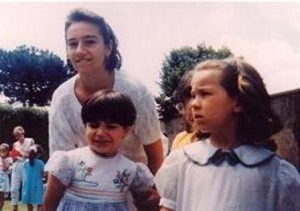 |
Chiara Luce Badano helping younger girls in living the Gospel
Essentially here, we are discussing every person’s search for happiness. But, Jesus has his own ‘recipe’ for happiness and this can be found in the ‘Beatitudes’ (Matthew 5; 1-12 or Luke 6; 20-23). Sometimes, the opening phrase of each ‘Beatitude’ reports Jesus as saying: “Blessed are you … …”; and sometimes, they begin: “Happy are you … …”. Our liturgical texts, at present, use the word ‘happy’. It sounds a weaker and rather less noble word than ‘blessed’, and yet it has the advantage of being easily understood; it also corresponds more with our experience of today’s ordinary life. Jesus’ recipe’ for happiness is diametrically opposed – runs ‘clean counter’ – to what the ‘world’ would expect. For instance, one thing he says, in Beatitudes, is: “You will be happy, if and when, you are in tears”.
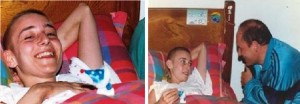 |
Chiara Luce Badano a few months before she died of a painful cancer in 1991
Jesus is inviting us to look again at what happiness is. We imagine happiness is something akin to a state of pleasure for our senses giving us continual emotional ‘highs’. Jesus says something quite different … you will be happy not only when you feel good feelings, but when you actually face up to reality, and ‘link’ with it. This implies a continual, obstinate searching for the good. If one spends all one’s life living for what is good – trying to build good all around one, then one will find happiness. The ‘Gospel-person’ realises that evil is so widespread, and deep, that it has no limit. To overcome evil, there must be no limit to doing good; it must never have a boundary. This is the message of the Beatitudes.
One of the eight ‘Blessings’ is: “Blessed are the pure in heart, they shall see God”. Purity of heart is much wider than purity in sexual affairs, though it includes the latter, and impurity in sexual matters will break the heart. In this narrow sense, it is easy to be cynical and think that purity is just for those people who are simple minded and do not live in the real world of constant impurity and evil. The larger, wider, meaning concentrates on what it means to be single minded and focussed, undivided, unmixed and resolute in what we do – to desire and will one thing, and one only. Purity of heart has God as its one and only focus.
Chiara was declared ‘Blessed’ by the Church on 25th September 2010, and there was then a whole series of celebrations concerning this young girl and her life, tragically cut short, for she was only 18 years of age, when she died of osteogenic sarcoma, – one of the most serious and painful forms of cancer.
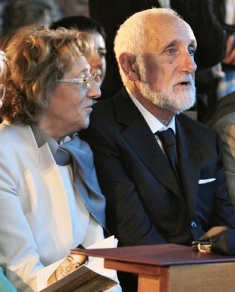 |
Chiara’s Parents – Ruggero and Maria Teresa Badano
Throughout her terminal illness, she was supported by her parents, by those with whom she was united in the family of the Focolare Movement, by the doctors and nurses and many other friends. Her loving acceptance of her ‘lot’ – incurable cancer, et al – with great joy, and her continual concern for others was remarkable – a sign of holiness that has affected many people. Her life was an expression of holiness ‘in the mystical body’ – embracing those who remain and those who have gone before – somehow caught up in a ‘holiness of unity’. This is not very surprising, when we remember that all Christians are united, with others, in the one body of Christ; this means we are all involved with each other, for good, or for bad.
 |
Some of the 25,000 people at a vigil in St. Peter’s Square Rome – And other celebrations at the beatification of Chiara Luce Badano September 26 2010
If anyone wants to look up more about Chiara Luce Badano, then look up the website http://www.chiaraluce.org/ and click on the small Union Jack for the English Version. At present only the section marked “life” has anything in it. There are other websites available if you search under the name Chiara Luce Badano.
